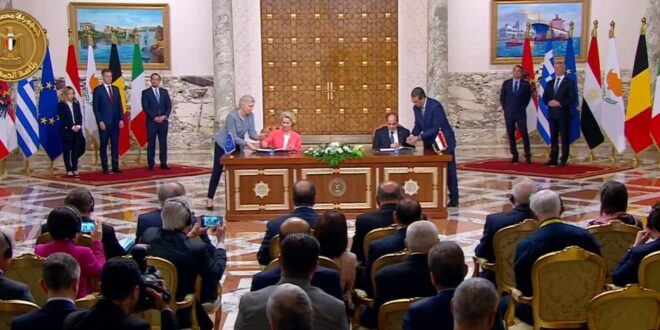The European Union (EU) and Egypt have made a deal under which the north African country will receive financial support in return for closer cooperation on migration with the 27-nation bloc.
“Today, President Abdel Fattah El-Sisi and President of the European Commission Ursula von der Leyen signed the joint political declaration document to elevate relations between Egypt and the European Union to the level of strategic and comprehensive partnership,” the Egyptian presidency announced on Sunday.
Italian Prime Minister Giorgia Meloni, Greek Prime Minister Kyriakos Mitsotakis, Cypriot President Nikos Christodoulides, Austrian Chancellor Karl Nehammer, and Belgian Prime Minister Alexander De Croo joined Dr von der Leyen in the signing of the joint declaration with al-Sisi on Sunday in Cairo.
Under the agreement, which some critics say prioritizes countering migration over human rights, the EU will provide assistance totalling €7.4 billion to Egypt’s government to, among others, bolster its economy, fortify its borders, especially with Libya, a major transit point for migrants fleeing poverty and conflicts in Africa and the Middle East.
The funds will also support the Egyptian government in hosting Sudanese fleeing the fighting in their country, a way to encourage them to stay in the region and not to attempt to seek refuge in Europe. Egypt currently hosts approximately 450,000 refugees from Sudan.
The agreement also comes at a time when Egyptian migration to Europe has been rising. Due to economic difficulties in the country, Egyptians increasingly are seeking greener pastures in Europe. From January to October 2023, 16,413 migrants arriving by boat in Italy declared themselves to be Egyptian, making them the second largest group behind Tunisians, according to data published by Italy’s interior ministry.
The agreement, which upgrades the EU’s relationship with Cairo to a “strategic partnership”, aims to boost cooperation in several areas to help Egypt tackle its current very high inflation.
The EU-Egypt deal is similar to the one reached by the bloc with Tunisia last year. Both deals have been criticised by socialists, liberals, and part of the centre-right European People’s Party (EPP) in the European Parliament, who do not consider Egypt and Tunisia as countries that guarantee respect for human rights.
Egypt has often been criticized for repressing the opposition which is why Human Rights Watch has condemned the deal with the Egyptian government, stating that it “rewards Egypt’s autocratic leader Abdel Fatah al-Sisi for preventing migrants’ departures towards Europe”.
Adira Kallo
 THE AFRICAN COURIER. Reporting Africa and its Diaspora! The African Courier is an international magazine published in Germany to report on Africa and the Diaspora African experience. The first issue of the bimonthly magazine appeared on the newsstands on 15 February 1998. The African Courier is a communication forum for European-African political, economic and cultural exchanges, and a voice for Africa in Europe.
THE AFRICAN COURIER. Reporting Africa and its Diaspora! The African Courier is an international magazine published in Germany to report on Africa and the Diaspora African experience. The first issue of the bimonthly magazine appeared on the newsstands on 15 February 1998. The African Courier is a communication forum for European-African political, economic and cultural exchanges, and a voice for Africa in Europe.



































